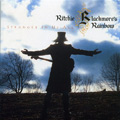|
||||||
|
Beyond the simple enjoyment one gets from listening to a good album, Ritchie Blackmore’s Rainbow 1995 effort Stranger in Us All is intriguing for two notable reasons. The first; that it is essentially a Ritchie Blackmore solo album Sony BMG Music Entertainment thought needed the Rainbow tag to encourage sells, similar to Black Sabbath featuring Tony Iommi’s (insert sarcastic laugh here) Seventh Star. Apparently it wasn’t enough that the majority of people with any interest in the album would unmistakably know who Ritchie Blackmore was (former guitarist for two iconic bands in Deep Purple and Rainbow), they needed to squeeze every nickel and dime that name dropping could achieve. The second reason is that this would be the final rock album Ritchie Blackmore delivered prior to focusing solely on the renaissance folk fare of Blackmore’s Night with his wife Candice Night, and to the utmost of his god given ability… essentially becoming a hobbit. Let that sink in for a moment. The man that wrote arguably the most iconic riff in classic rock history with Smoke on the Water, plus countless other classics between his Deep Purple days and Rainbow (Man on the Silver Mountain just to name one) now spends his days frolicking about playing folk music. This is a guitarist that, in classic rock terms, is 1B to Jimmy Paige's 1A and Stranger in Us All is basically him telling the world “yeah thats it for me; I’m off to the Shire now”. Intriguing, no? Listening to Stranger in Us All is like watching an artist that can still paint abstract with the best of them, but is tired of doing so just because he is great at it. The riffs are strong, the leads are top notch Ritchie goodness, and the performances from the contributing members are admirable, but overall there is just a sense that he is going through the motions because it is expected of him. Even outstanding tracks like Stand and Fight and Hall of the Mountain King would instantly be overshadowed in a live setting by his countless other classics, and I believe that is why this is his final rock album. Why bother rehashing the same formula when your legacy is already set in stone and your heart is no longer in it? Part of me is starting to wonder if Iron Maiden should start pondering that question as well, but I digress. Despite all of that, there is still a good album to be found here. Ritchie’s song writing prowess aside, a large contribution is made by hired gun Doogie White on vocals. While not possessing a voice meant for the big time (he was beat out by Blaze Bayley for the Iron Maiden job), his performance here is strong none the less. Singing in a safe middle range that never exceeds his limitations, Doogie shines enough to push the album out of mediocre territory, and lends it some memorable moments. Wolf to the Moon starts things off with a bang, providing a quick pace and catchy chorus that is a strong representation of the modern hard rock sound Stranger in Us All strives for. Cold Hearted Woman follows suit with a more groove oriented approach, but then comes a curve ball with Hunting Humans (Insatiable) which moves with a far slower and somewhat more sinister pace. It would frankly be forgettable were it not for the vocal delivery, which comes at you with a hypnotic rhythm. Stand and Fight is a hell of a rocker, and gets my vote for best song on the album, though the sprawling and more technical Ariel gives it a run for its money with Ritchie’s best lead work (and featuring a guest appearance by Candice Night on vocals). From there the album falls into a blur of good but not great songs (though Black Masquerade is notable for its orchestra theatrics) until Hall of the Mountain King strikes. While not technically inspired, this song rocks out with the best of them and just harks back to Ritchie’s Rainbow glory days. Still I’m Sad is a Yardbirds cover, decent but not much else to say about it. If Stranger in Us All is what Ritchie Blackmore had left in the tank after decades of being at the top of his game, then it was probably the right choice to call it a career at that point in his life. More than a few artists keep plugging away simply because they think it is what the world expects of them, often with sub-par results, and I have no doubt that Ritchie finds working with his wife on their band immensely fulfilling. Still, for the rest of us that know this album heralded the end of a career that is unmistakably among the finest classic rock has to offer, it is bitter sweet. If like me you are someone that appreciates not just the music, but the history behind it, then I recommend you give this album a spin. Finding it might be tricky though. To my knowledge it only exists as an import, one that after years of searching in various record stores I finally succumbed to purchasing online. Still, it is a worthy addition to any collection. |
||||||
|
Killing Songs : Stand and Fight, Ariel, and Hall of the Mountain King |
Cory
quoted
76 / 100
Stefan quoted 60 / 100 |
|||||
|
||||||



There are 14 replies to this review. Last one on Sat Dec 15, 2012 11:42 pm
View and Post comments